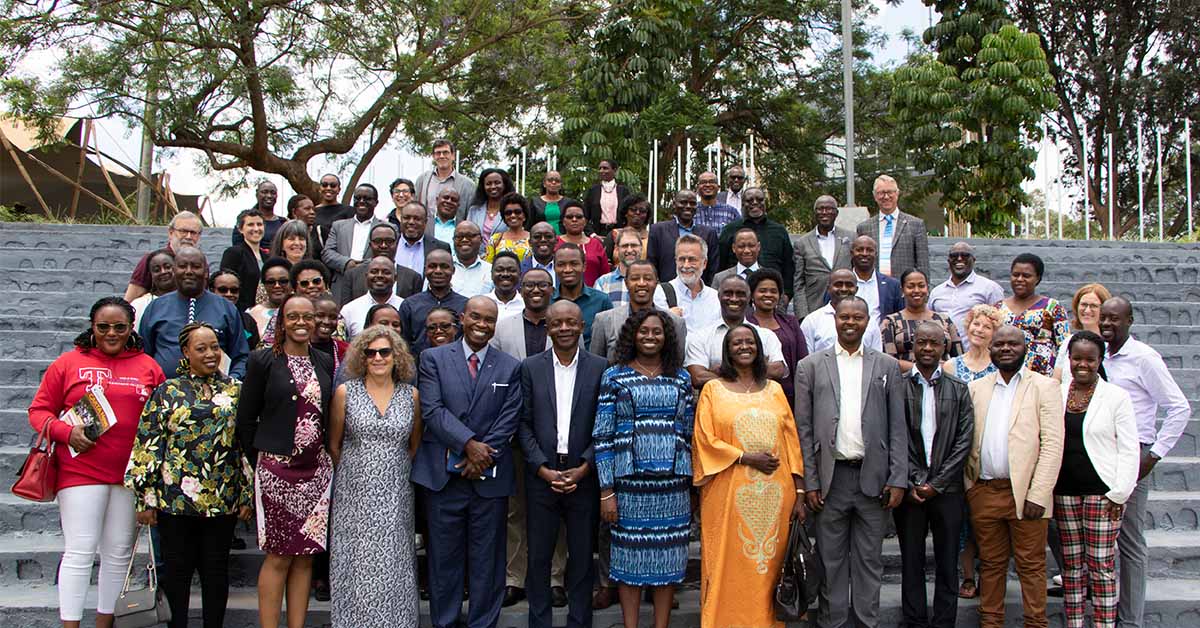The University of Rwanda (UR) is one of CARTA’s long-standing eight African Partner Universities. To date, 24 CARTA fellows are UR faculty members (8 graduates and 16 in progress). CARTA has trained 10 postgraduate supervisors based at UR through the Supervisors Workshop (SW), and 53 faculty and staff members through the Academic, Professional, and Administrative Staff Seminar (APAS).
Between August 2021 and September 2022, 12 UR staff were involved in CARTA’s Training of Trainers (ToT) initiative for the various CARTA interventions (SW, APAS, and Joint Advanced Seminars –JASes) as participants and as part of facilitators for the JASes ToT. The ToTs are part of the program’s mainstreaming efforts that aim to equip participants with skills and knowledge to independently carry out the different CARTA interventions at respective institutions. Moreover, UR hosted the joint CARTA JAS ToT, a role it will also play in the subsequent years.
On September 26, 2022, CARTA together with UR held a partnership forum that sought to marshal support for increased visibility, understanding, and engagement of the CARTA program at the University of Rwanda. The forum was held at the Kigali Convention and Exhibition Village in Kigali.
In attendance were representatives from UR management- Prof Nosa O. Egiebor – Deputy Vice-Chancellor for Academic Affairs and Research, Dr. Raymond Ndikumana – Deputy Vice-Chancellor for Strategic Planning, and Prof Jeanne Kagwiza – Principal of the College of Medicine and Health Sciences; focal persons from CARTA’s partner institutions; and CARTA fellows and graduates based at UR. The UR CARTA focal persons – Pierre Claver Rutayisire (Acting Principal of the College of Business and Economics and Senior Lecturer) and Moussa Hakizimana (Senior Lecturer) moderated the proceedings of the day that had a range of informative and interactive sessions.
The forum kicked off with an overview of the CARTA program that was delivered by CARTA’s Co-Director, Prof. Sharon Fonn. She took time to talk about the program’s current strategic phase – CARTA2025 – highlighting that to realize the CARTA2025 Theory of Change, each of the partners had an important part to play in making their institutions centers of research excellence that impact society, both in their engagement with CARTA and beyond.
Success stories
In a thought-provoking session, seven UR CARTA fellows presented highlights of realized successes that they attributed to CARTA in various aspects that include scientific publishing, teaching, quality of research, and attraction of grants.
“As a lecturer, I learned much from CARTA facilitators about teaching methodology, particularly sandwich methods during class interaction. I have since been applying the same methodology during my class sessions and students are more attentive and satisfied with the delivery of sessions.” Celestin Banamawa – Cohort 7 fellow based at the Makerere University, Lecturer at UR
“The CARTA program has made my doctoral study a lot easier, more competitive, and scholarly. I have authored and co-authored 10 journal articles; five of which are out of my PhD work.”Aurore Nishimwe – Cohort 7 fellow based at the University of the Witwatersrand, Lecturer at UR
“I am one of the three CARTA graduates who started the institutionalization of CARTA activities at the University of Rwanda through an educational project grant which culminated with the development and approval of an Inter-disciplinary Research Methodology module. The module is currently being delivered across all PhD programs at the university.” Celestin Ndikumana – Cohort 5 graduate, Lecturer at UR
“With the encouragement of CARTA, I managed to win one fellowship on research administration and management. With this fellowship, I spent six weeks at Georgia State University, USA and learned much. I now use the acquired knowledge to support students and colleagues in research management and administration.” Noel Korukire – Cohort 9 fellow, Lecturer at UR
“I was promoted to a Lecturer from an Assistant Lecturer position and this promotion was supported by my achievement of having won a CARTA fellowship at the time. Moreover, I won several travel grants including a one-month stay at Harvard University to learn about ethical issues in global health research and a one-week workshop organized by the Kenya Biology of Parasitism (KENBOP).” Julienne Murererehe – Cohort 8 fellow based at the University of the Witwatersrand, Lecturer at UR
Besides the fellows, a UR faculty member, Berthilde Uwamwezi, an Academic and Digital Library Services Specialist expressed gratitude to the program for the skills and knowledge she gained through the APAS training held in June 2022 at Makerere University. She said, “I gained a lot from the APAS training and I am very happy that the methodology I learned is working. I am applying it in the training I do with librarians at graduate and postgraduate levels. Participants are engaged and appreciative of the training approach.”
Institutionalization of CARTA at UR
Between 2017 and 2019, UR implemented a project that sort to institutionalize aspects of its interventions and innovations. This was through a seed grant provided by CARTA dubbed the ‘Intra-university Collaboration for Advanced Research Training at University of Rwanda (ICARU)’. The project sought to mainstream a doctoral multidisciplinary research methodology module, adapted from the CARTA JASes intervention. At the end of the project, the main goal was fully realized. The research methodology module is now embedded in UR’s doctoral training and compulsory for all PhD students. According to the UR team, institutionalizing the CARTA JASes in doctoral research training has greatly enhanced PhD training at the university and the quality of ECR outputs.
The forum was concluded with promising commitments from representatives of the UR’s management – Prof. Egiebor, Dr. Ndikumana, and Prof. Jeanne Kagwiza, who pledged to not only continue supporting the CARTA-UR partnership but also increase the number of UR-based participants in CARTA interventions. In this regard, Dr. Ndikumana committed to explore/source for funds that can finance the participants and beyond that, support CARTA-like activities at the University.




